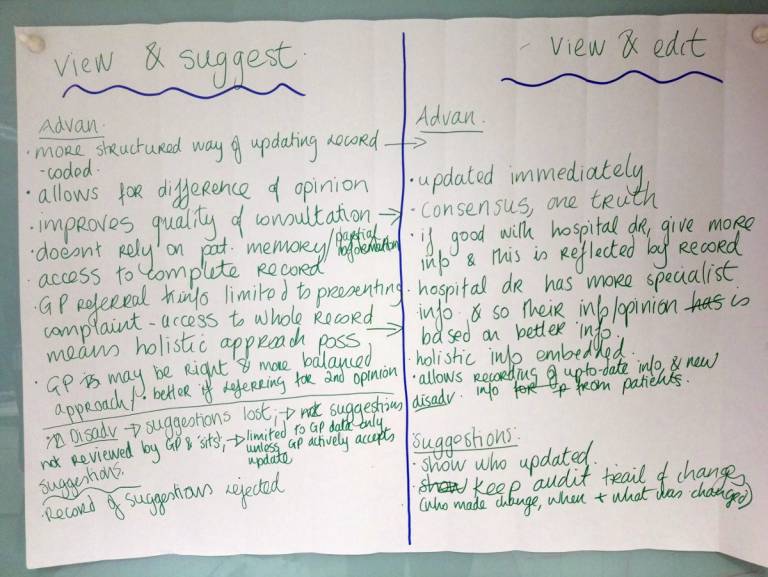Patients are in favour of using free text in GP records for medical research
7 May 2019
17 members of the UCLH NIHR Biomedical Research Centre (BRC) Patient and Public Involvement group attended a workshop where they were asked to generate and discuss ideas on a research database containing free text from GP records.

Information about patients’ health problems are very important for their care, but currently much of the information is recorded as ‘free text’ (words and sentences) rather than in a coded, numeric form, which makes it difficult to find relevant information for clinical care. GPs keep a simple list of health problems on their computer, but detailed information is often ‘hidden’ in free text letters written by specialists. Free text may be extremely useful for research to improve patient care, but it may also contain personal information, and is generally not available for research. One aim of the workshop was to find out how patients felt about a research database containing free text from GP records.
Another problem is that GP records are not very detailed, because it takes too much effort for GPs to manually add information from specialist letters. Could a shared diagnosis record help? Some professionals like the idea, but others worry that the record may become confusing. We thought this was another important question which needed to be considered from the patient’s perspective.
The workshop
We invited patient members of the UCLH NIHR Biomedical Research Centre (BRC) Patient and Public Involvement group to a workshop on 3rd April 2019. Seventeen people attended. We asked them to generate ideas and discuss these issues in two groups.
Results
Participants thought that free text in GP records was a valuable resource and they were overall in favour of using it for medical research. They thought that free text could provide extra detail, improve data quality or identify symptoms before a diagnosis. They were concerned about security and commercial exploitation, and suggested that data should be stored securely with rigorous monitoring involving patient representatives. They also stressed the importance of good communcation with patients and the public about the way free text was used for research.
On the subject of sharing diagnosis records, participants were mostly in favour of specialists being able to edit GP records as long as there was a record of who made the change and why.
Impact and next steps
Patients’ views on the use of free text in research were presented at the healthcare free text research community (Healtex) in Cardiff on 24th April 2019 (www.healtex.org/healtac-2019/).
The findings on patient preference for diagnosis sharing will feed into a national report on diagnosis recording being prepared by the Royal College of Physicians Health Informatics Unit and the Professional Records Standards Body (https://theprsb.org/).
We have been awarded a £500 starter grant from the UCLH NIHR Biomedical Research Centre to support ongoing patient involvement in the THIN Advisory Committee.
Funding and acknowledgements
We would like to thank the participants who made this workshop so successful, Nicola Quinn of the RCP Health Informatics Unit for co-facilitating the workshop, and Angela Wipperman, Patient and Public Involvement manager of the UCLH NIHR BRC, for providing patient contacts.
The workshop was funded by a THIS.Institute postdoctoral fellowship to Anoop Shah.
 Close
Close

